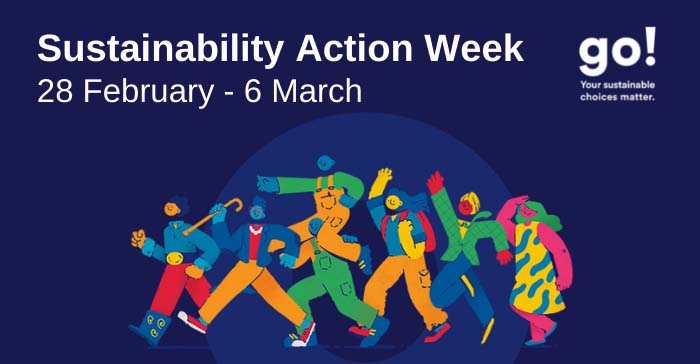
March 1, 2022, by Ryan Neal
The Sustainability Challenge – day two
In celebration of Sustainability Action Week, we’ve challenged two of our senior leaders – Andy Nolan, Director of Development and Sustainability; and Professor Sarah Speight, Pro-Vice-Chancellor for Education and Student Experience – to spend the week living as sustainably as possible. Each day they will be chronicling their experience and sharing some tips so make sure you check back regularly.
Sarah
Travelling while I work
This is day two of Sustainability Action Week and I’m starting this blog on the bus. I enjoy using public transport, but you do have to plan carefully. I think about time, weather, and weight!
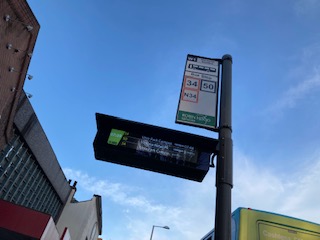 In the mornings, it takes me three times as long to walk and bus/tram to campus than it would do to drive. It’s a nuisance that there isn’t a direct route from where I live (north-east of the city), but I do get more exercise this way. The travel time isn’t wasted either. I enjoy seeing how the cityscape changes with the seasons – in St. Ann’s, the crocuses are emerging, and the daffodils are just behind them. On my walk, I was thinking about what I need to progress this week – I was worried I might forget something and so I recorded a message to myself on my phone. Once on the bus, it was time to do some language lessons using my phone app – I’m learning Greek. Arriving at University Park early on a bright crisp day is a real pleasure.
In the mornings, it takes me three times as long to walk and bus/tram to campus than it would do to drive. It’s a nuisance that there isn’t a direct route from where I live (north-east of the city), but I do get more exercise this way. The travel time isn’t wasted either. I enjoy seeing how the cityscape changes with the seasons – in St. Ann’s, the crocuses are emerging, and the daffodils are just behind them. On my walk, I was thinking about what I need to progress this week – I was worried I might forget something and so I recorded a message to myself on my phone. Once on the bus, it was time to do some language lessons using my phone app – I’m learning Greek. Arriving at University Park early on a bright crisp day is a real pleasure.
If I’m leaving campus after 5pm, it can be quicker to use public transport than to drive, even though I need two buses or a tram and a bus. On the way home, I check my emails and make a list of all the things I need to do for the next day. I definitely prefer using public transport over driving as I can do something productive – it’s not dead time.
The weather at the moment is fine for walking – wet and mild. Torrential rain might force me into the car, but the main deterrent is ice as my walk into the city centre is downhill. Sometimes my local bus stops running when we have ice and snow but generally, I find that the main weather-related issue is choosing the right clothing so that I’m neither too hot nor too cold.
Most of my t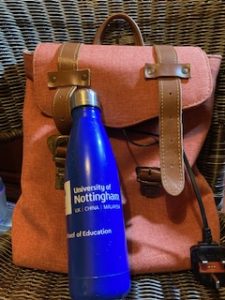 ravel-related planning is in relation to weight. I have a small rucksack in which I carry my large notebook, my water bottle and my lunch. If I can avoid carrying my laptop, I will as it makes my bag quite heavy. I have a desktop computer in my office in the Trent Building so, while most of our meetings are still online, I can do without my laptop at work. However, as we move back to more and more in-person meetings, I’m finding I need to think ahead and consider the best approach to each day – do I carry my laptop, or do I print out the meeting papers? I don’t really want to do either. But I definitely want my big note-book – I know that I learn best when I take notes by hand rather than typing. It’s these small-scale, individual practical considerations that go through my mind every evening as I pack my bag for the next day. Colleagues who are hot-desking will be doing the same thing.
ravel-related planning is in relation to weight. I have a small rucksack in which I carry my large notebook, my water bottle and my lunch. If I can avoid carrying my laptop, I will as it makes my bag quite heavy. I have a desktop computer in my office in the Trent Building so, while most of our meetings are still online, I can do without my laptop at work. However, as we move back to more and more in-person meetings, I’m finding I need to think ahead and consider the best approach to each day – do I carry my laptop, or do I print out the meeting papers? I don’t really want to do either. But I definitely want my big note-book – I know that I learn best when I take notes by hand rather than typing. It’s these small-scale, individual practical considerations that go through my mind every evening as I pack my bag for the next day. Colleagues who are hot-desking will be doing the same thing.
Pre-pandemic, I had already made a personal commitment that I would not bring a car onto campus more than twice a week. Even twice a week is a very rare occurrence now and, although I still own a car, I think it may be my last one. I use my car so seldom that it doesn’t make financial sense to maintain it while also paying for a bus/tram pass. A friend of mine is learning to drive at the moment. We have discussed car sharing and I think this would be a good interim step.
Turning from my personal transport conundrums to more significant matters, it’s been a hectic but satisfying day – unfortunately, I didn’t make it to the Sustainability Fair. The highlight of the day was a meeting with some of our students, the SU Welfare and Wellbeing Officer and a colleague from the Widening Participation team to talk about our plans to sign up to the Standalone Pledge to support students who are estranged from their families. It has been an eye-opener for me to understand more about the challenges these students face – they may have fled abuse from family members or have been forced out because they didn’t conform to cultural or social expectations. Many of them have experienced periods in care.
My own family were so supportive of my ambitions to go to university. Talking to our students today made me reflect on my good fortune. I also had a friend from my sixth form college to start university with – we were on the same course and lived in the same hall of residence. Estranged students often don’t have any networks of their own to help them in the transition to higher education. They may lack networks and role models; they may be having to work long hours to achieve a level of financial stability and they clearly face a series of hurdles that many of us cannot fully understand. I didn’t know about the Standalone Pledge until recently and I’m really pleased that we’re getting ready to sign up – we have to understand the experiences of these students and do what we can for them.
Time to head home now. I think it’s veggie risotto for tea.
Andy
Today I’ve travelled to Birmingham to meet with other estates directors to discuss how we can decarbonise our university estates. A year ago, we’d certainly be doing this online but there are real benefits to doing it face to face. Again, I travelled by train from Sheffield to Birmingham. It only takes just over an hour and 15 minutes and that gave me time to do some work. As I walked to the station, I heard the news that rail fares are going up by an average of 3% today – not good news. We need to make rail travel more affordable if we’re to shift people to more sustainable modes of travel.
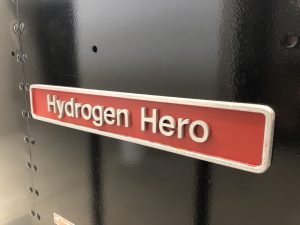 Our meeting in Birmingham though is about the challenge of decarbonising our campuses and sharing ideas and practical things we’re doing already. The university recently adopted its new carbon management plan which covers emissions associated with the direct burning of fossil fuels on campus (natural gas, petrol, diesel, etc), the emissions associated with the generation of electricity we consume, and emissions associated with the goods and services we buy. The latter will include the emissions that come from the extraction of materials (such as metals), energy in manufacture, packaging, and distribution (shipping, flights). We call these Scope 1, 2 and 3 respectively.
Our meeting in Birmingham though is about the challenge of decarbonising our campuses and sharing ideas and practical things we’re doing already. The university recently adopted its new carbon management plan which covers emissions associated with the direct burning of fossil fuels on campus (natural gas, petrol, diesel, etc), the emissions associated with the generation of electricity we consume, and emissions associated with the goods and services we buy. The latter will include the emissions that come from the extraction of materials (such as metals), energy in manufacture, packaging, and distribution (shipping, flights). We call these Scope 1, 2 and 3 respectively.
Those responsible for developing, maintaining and running university estates have an important role to play in reducing scope 1 and 2 emissions but they all have plenty of challenges. University estates are responsible for tens of thousands of tonnes of carbon emissions in any given year (Nottingham’s campuses are around 40,000t). Some of the things we discussed included retrofitting buildings to improve thermal performance (like putting on an extra jumper), technologies such as heat pumps, solar and the future of gas combined heat and power. We also discussed offsetting and the role it could (or should) play.
What we did agree is that there are things we might do better together. Imagine if all the universities combined their investments into large scale renewables such as wind turbines.
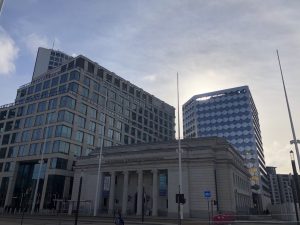 The University of Birmingham hosted us in the Exchange Building in Centenary Square, opposite the City Library, a beautifully reappointed former bank. In the old vault was a fantastic exhibition focusing on climate change, carbon emissions and air quality; a really neat display that showed the impacts of consumption, energy and its impact on the planet.
The University of Birmingham hosted us in the Exchange Building in Centenary Square, opposite the City Library, a beautifully reappointed former bank. In the old vault was a fantastic exhibition focusing on climate change, carbon emissions and air quality; a really neat display that showed the impacts of consumption, energy and its impact on the planet.
While estates directors play a significant role in campus sustainability, sustainability on campus isn’t always someone else’s responsibility – it’s for all of us to make a difference. Before I conclude, I wanted to take a moment to highlight three people I met yesterday who are all committed to doing their bit.
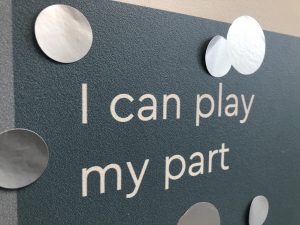 Firstly, it was a pleasure to meet Adriana in the Zero Waste store in the Portland building. I remember when it was an infrequently used meeting room – it’s been put to much better use now. It was quiet when I popped in, so it gave me the opportunity to have a chat with Adriana, a fourth-year Architecture student. The shop is full of great package-free food and other essentials – like washing-up liquid – and is well worth a visit. It’s conveniently located at the heart of the campus in the Portland Building. Check it out.
Firstly, it was a pleasure to meet Adriana in the Zero Waste store in the Portland building. I remember when it was an infrequently used meeting room – it’s been put to much better use now. It was quiet when I popped in, so it gave me the opportunity to have a chat with Adriana, a fourth-year Architecture student. The shop is full of great package-free food and other essentials – like washing-up liquid – and is well worth a visit. It’s conveniently located at the heart of the campus in the Portland Building. Check it out.
Then I met John and Hannah, two of the committed group making our campuses more hedgehog friendly. They were both litter picking during their lunch hour – picking up the discarded and wind-blown litter that gets caught up around the trees on Keighton Hill. They were doing a fantastic job and removing all the plastics and paper that accumulate there. I am sure the squirrels, geese and rabbits welcomed their efforts too. Keep up the great work, both of you!
Find out how Andy and Sarah got on on day one, day three, day four and day five.

Sarah, I agree that there should be cross-city buses to the university. It would encourage more people to take the bus – I don’t think many car owners would do as you do and walk/bus or catch two buses!
There used to be a direct bus from Mapperley to QMC, so it can be done. Could the university lobby NCT about it? I have tried a few times and they weren’t interested, but they might respond to a suggestion from the university.